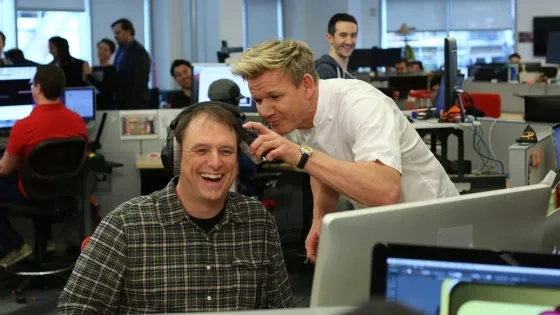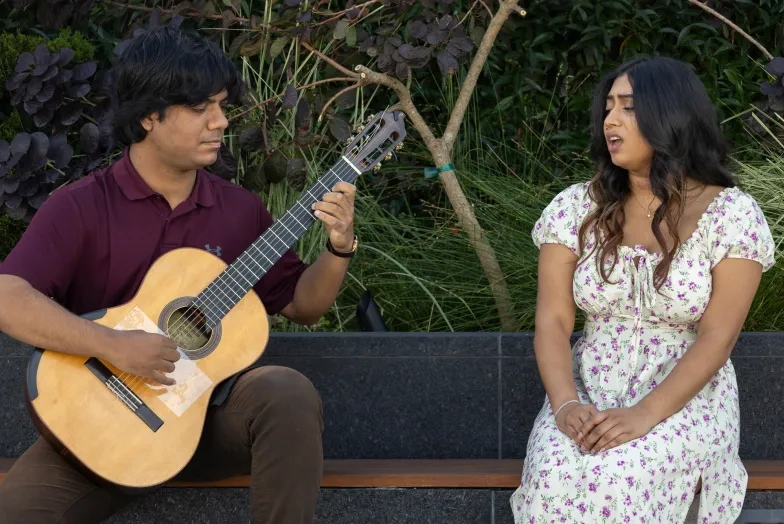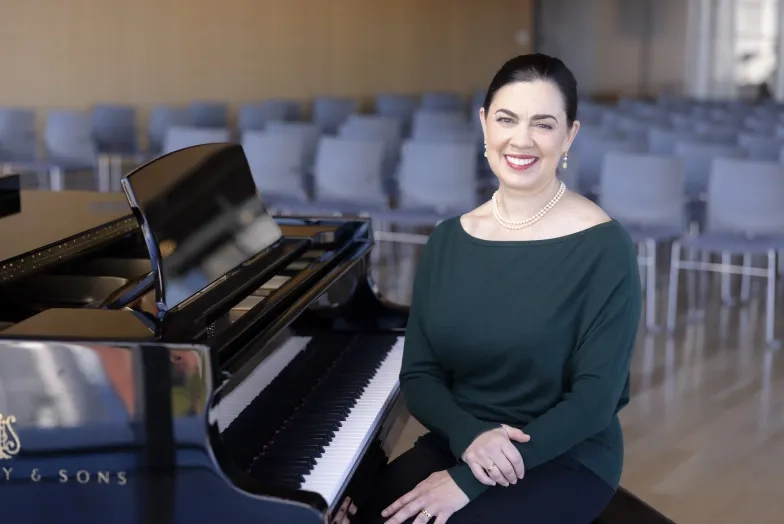In Conversation - Dren McDonald on Gordon Ramsay DASH
Composer Dren McDonald — on faculty with SFCM’s Technology and Applied Composition program — recently completed work on the new mobile game Gordon Ramsay DASH. (Now available for download. View the game trailer here.) In this Q&A, McDonald fills us in on the sound design and compositional process… and divulges details about what it was like working with Gordon Ramsay.
What is Gordon Ramsay DASH?
It's the latest mobile game from Glu Mobile (here in SF) featuring world-famous celebrity chef Gordon Ramsay. You learn a bit about starting a restaurant, managing resources, time management, and you get to listen to Gordon coach you through the whole experience!
How did you get involved with this project? What were you responsible for during production?
I've been working with this team at Glu for a long time — since they were Playfirst. They were acquired by Glu two years ago, but I've been working with them as their audio resource for several years. We worked on previous titles such as Cloudy with a Chance of Meatballs 2: Foodimal Frenzy, Diner Dash 2015, and Cooking Dash 2016. The VP of creative and lead game designer, Tom Hall, is someone I've worked with since we were both at Loot Drop (Pettington Park). Tom is a great designer, super creative, and really fun to work with. He was also one of the founders of Id Software, responsible for helping create Doom, Wolfenstein 3D, Quake, and Commander Keen.
I was responsible for all of the audio (music, music production, sound design, voice-over, and implementation), and this time that included an entirely new audio pipeline because we introduced the use of audio middleware into the development cycle. So I had a bit more responsibility on this title than on previous titles, but I actually pushed for that. There was going to be a lot more audio content for Gordon Ramsay DASH than our last title together (Cooking Dash 2016), and we had less time to launch this game than the previous one, so using middleware helped us speed up our process and allowed us to change/iterate our sound events quickly.
How did the game's premise and player interaction tailor your approach to music and sound design?
Fortunately, I've been through the development cycles of Diner Dash 2015 and Cooking Dash 2016, which have a lot in common with Gordon Ramsay DASH, so I had some ideas on how to improve on what we'd done with those titles. One of the tricky things to achieve with these games is to create a feeling of chaos without the game's audio becoming really annoying and repetitive. There are the sounds of the kitchen, cooking, delivering the food, the drinks, then the UI sounds, (communicating game actions/achievements), the music (which has to change intensities), and the voice-over (including the customer voices). So there's a LOT going on! I knew that I needed a strategy to keep the game sounding interesting without sounding like white noise. This started with a big picture view of how the sound design (especially the User Interface sounds) would work with the music.
In addition to creating UI sounds that work (musically) with the background music, I tried to think about the EQ spectrum of the music and the UI and VO so that everything had its own space. But sometimes I couldn't always follow those rules. For instance, there's a level that requires Artie Shaw-like jazz, so we needed to have clarinet and trumpet in the music, and sometimes those instruments would be playing in the same part of the EQ spectrum that the UI sounds were using… so I had set up a lot of sidechaining within the audio middleware so that VO always ducks all sound groups, and sound design will always duck music. That helps to carve out some of that space as well. But it really does help if you can approach it early on with a musical strategy, followed by an idea of where the UI sounds are going to be most active within the EQ spectrum.
Since we were using audio middleware, I had the chance to keep the music fresh by creating a dynamic music system which would react to the gameplay. For instance, when you start a game round at the beginning of a season, the music is fairly relaxed, and then becomes slightly more intense within each round, but as the season goes on, the music becomes a lot more intense as the rounds continue. There are surprises as well — the season that has the Artie Shaw-inspired music has several sections that will play randomized clarinet or trumpet solos so that each time you play a round, you might hear a different version of the music.
Even the map has dynamic music going on behind it, and this is actually an exercise that I assigned to my Game Audio class last semester (they had to implement it in FMOD, as well). There are five different regions of the map, and the game designer wanted the music to change as the player moved the map to reflect what was happening geographically. So when the game opens, the player is within the restaurants of North America, so the player will hear a cue that reflects North America (in this case, a Beck-inspired mashup of funk beats, lap steel guitar, banjo, and electric guitar), but as the player turns the map towards the Atlantic ocean (and hears some ocean sounds), by the time they get to Europe, the same cue (same tempo, key, length, etc.) has changed the instrumentation to reflect the brass of English royalty and the bagpipes of Scotland all over a Euro-dance synth beat. This continues across the globe through Russia (balalaikas), the Middle East (oud), and Asia (shamisen, guzheng, taiko) until the player comes back to North America.
What part of sound production presented the most challenging obstacle for you?
As I alluded to previously, the toughest part of this game is the mix. The music had to be interesting but not fill up a lot of space. Catchy, but not annoying (hard to do in a 45-second loop). The sounds had to be very short, but communicate the game state and player achievements easily. All of these things had to happen while the player could still hear Gordon talking to them as his voice is the most important aspect of the audio in the game.
The other challenge is the creative music composition assignments that I get for a game like this. On Cooking Dash, we had venues like the "Hair Metal Italian Restaurant" where I created cues that included both traditional Italian mandolin parts AND stupid ‘80s whammy bar guitar harmonics. Or the "Paleo" restaurant where I was asked to create "catchy caveman music" which involved a lot of very primitive drumming and grunting (multi-layered) on my part. I still can't believe that music is in a mainstream game… it sounds like The Residents crashed a party at John Cage's house.
With Gordon Ramsay DASH, I had the Artie Shaw-inspired music level, which is actually supposed to be a mashup of Artie-type jazz with "Chicago"-style Broadway showtune type stuff. For direction, Tom sent me a scene from the ‘80s movie Xanadu where there is a big band dueling with the rock band The Tubes (from SF!) and said, "Do something like that but with Woody Allen jazz and Chicago Broadway tunes!" There's a lot of musical interpretation in my job. There's also an English pub that has "pastoral English folk music" mixed with "rowdy Irish punk, à la Flogging Molly.” These are the typical challenges I get… the Las Vegas venue is a blend of Vivaldi's Spring with slot machine sounds.
Did you get to collaborate much with Gordon Ramsay on aspects of the game?
Yes, he was great to work with. He worked a lot with Tom early on in the production. He had a lot of input about what he wanted to see with the building of a restaurant from the ground up, the "Wichelin" Star mechanic in the game (you need to keep your restaurant up to snuff!), the player versus player part of the game in ChefArena, and the overall humor that pervades the game. He's a funny guy, and Tom wrote such funny stuff for him that when we were at the voice-over sessions, there were moments when he was laughing so hard that he couldn't get the lines delivered for a while. And then that inspired Gordon to come up with a lot of his own lines… and that stuff is super funny. A lot of it is in the game. That type of collaboration is where the great stuff comes from in projects like this.
Where can we get Gordon Ramsay DASH?
It is free to download for both iOS and Android (AppStore, Google Play).
Interview conducted by Patrick Gullo



